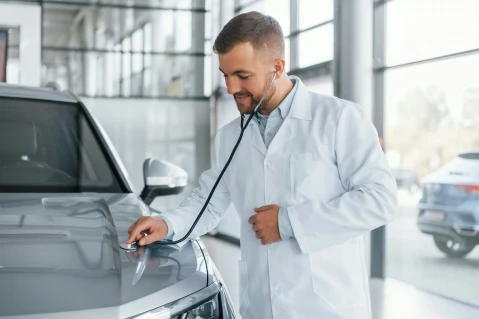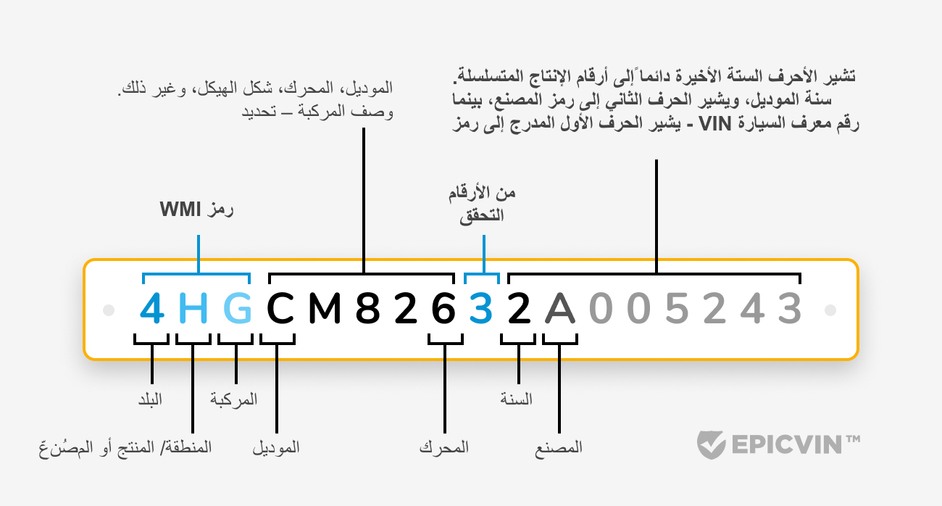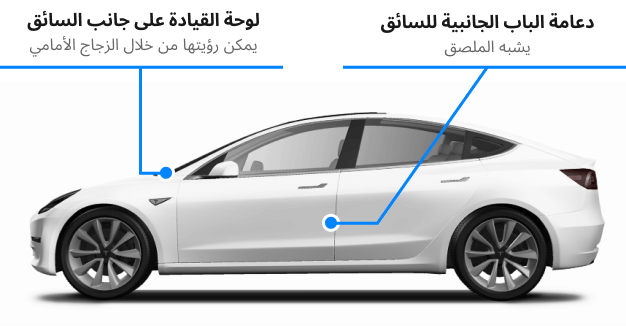
كيفية فك تشفير رقم VIN مثل المحترفين
بدءاً من فهم تفاصيل رقم VIN وصولاً إلى الكشف عن تاريخ السيارة، توفر لك هذه الم...
يقوم برنامج فك تشفير VIN المجاني من EpicVIN بفك تشفير VIN لأي سيارة على الفور للكشف عن مواصفات السيارة الرئيسية وأبرز الأحداث التاريخية دون أي تكلفة
"هل تبحث عن VIN؟
سوف تجده هنا:

EpicVIN أحدث بيانات السيارات في السوقروبرت ب. ألريد، خبير السيارات
يعد استخدام وحدة فك ترميز EpicVIN أمرًا بسيطًا. اتبع الخطوات التالية وتعلم كيفية فك تشفير تسلسل معين:
رقم تعريف المركبة (VIN) هو تسلسل فريد من 17 حرفاً. يتم تخصيصه لكل سيارة أو شاحنة أو دراجة نارية. يشبه رقم VIN بصمة السيارة. فهو يحتوي على معلومات حول العلامة التجارية للمركبة وسنة الصنع والشركة المصنعة والطراز وحجم المحرك. في الولايات المتحدة، أصبح رقم VIN الموحّد المكوّن من 17 رقماً إلزامياً لجميع المركبات منذ عام 1981، وفقاً لـ لوائح NHTSA. يستخدم التسلسل أرقاماً وحروفاً كبيرة فقط. لا يتم تضمين I و O و Q لتجنب الأخطاء. يُستخدم رقم VIN في السجلات الرسمية، مثل DMV وقواعد بيانات التأمين.
VIN (رقم تعريف السيارة)؟رقم تعريف المركبة (VIN) هو تسلسل فريد من 17 حرفاً. يتم تخصيصه لكل سيارة أو شاحنة أو دراجة نارية. يشبه رقم VIN بصمة السيارة. فهو يحتوي على معلومات حول العلامة التجارية للمركبة وسنة الصنع والشركة المصنعة والطراز وحجم المحرك. في الولايات المتحدة، أصبح رقم VIN الموحّد المكوّن من 17 رقماً إلزامياً لجميع المركبات منذ عام 1981، وفقاً لـ لوائح NHTSA. يستخدم التسلسل أرقاماً وحروفاً كبيرة فقط. لا يتم تضمين I و O و Q لتجنب الأخطاء. يُستخدم رقم VIN في السجلات الرسمية، مثل DMV وقواعد بيانات التأمين.
ينقسم VIN إلى ثلاثة أقسام رئيسية:

| الرموز | العينة | ما الذي يكشفه |
|---|---|---|
| 1 | 1 | بلد التصنيع (1 تعني الولايات المتحدة) |
| 3 - 2 | FT | الشركة المصنعة للمركبة (F تعني شركة فورد) |
| 8 - 4 | GHDLZ | العلامة التجارية، وحجم المحرك ونوعه العلامة التجارية، وحجم المحرك ونوعه |
| 9 | B | رمز التحقق من الأمان |
| 10 | G | معلومات سنة الطراز معلومات سنة الطراز |
| 11 | K | موقع مصنع التجميع |
| 17 - 12 | 456923 | الرقم التسلسلي الفريد |
قد تحتوي السيارات التي تم تصنيعها قبل عام 1981 على أرقام VIN أقصر.
يمكنك العثور على رقم VIN الخاص بالمركبة في عدة أماكن. يعتمد مكان العثور على رقم VIN الخاص بالمركبة على نوع السيارة:

إذا كان رقم VIN غير قابل للقراءة، فاستخدم البحث عن لوحة الترخيص كطريقة بحث إضافية للعثور على معلومات السيارة.
فهم سبب أهمية فك تشفير رقم VIN في عملية الشراء الذكي للمركبات. تشمل فوائد البحث عن رقم VIN التحقق من صحة السيارة وضمان السلامة. تتضح أهمية التحقق من رقم VIN عند النظر في هذه المزايا الرئيسية:
✅ التحقق: تأكيد الأصالة ومنع الاحتيال عند البحث في سجل السيارات المستعملة.
✅ التحقق: تأكيد الأصالة ومنع الاحتيال عند البحث في سجل السيارات المستعملة.
✅ المواصفات: فهم المحرك، وناقل الحركة، والسنة، ومصدر الصيانة.
✅ الوصول إلى السجل: استخدم البحث عن رقم تعريف السيارة للوصول إلى تقرير شامل عن تاريخ السيارة للحصول على معلومات أساسية كاملة.
يمكن للسيارات المتضررة في الفيضانات أو الحوادث إخفاء الأجزاء غير الآمنة - قم دائمًا بإجراء فحص VIN مجاني أولاً.David Glawe, NICB
إن شراء سيارة مستعملة دون التحقق من تاريخها أمر محفوف بالمخاطر – إحصائيات حوادث السيارات لدينا تثبت ذلك. تشكل الأضرار الخفية في السيارات المستعملة مخاطر جسيمة تغفلها عمليات التفتيش الأساسية. ولهذا السبب بالضبط يجب عليك التحقق من تاريخ السيارة قبل الشراء.
🚨 إحصائيات EpicVIN:
👉 هذه المخاطر غير مرئية من خلال البحث الأساسي عن رقم تعريف المركبة. يظهر تقرير سجل السيارة فقط التفاصيل الكاملة.
استناداً إلى أكثر من 10 ملايين رقم تعريف سيارة تم تحليلها من قاعدة بيانات EpicVIN الخاصة بشركة إبيكفين في عام 2024.
ما يقرب من 1 من كل 5 مركبات مستعملة نقوم بتحليلها يتبين أنها تم إنقاذها أو إعادة بنائها — وليس لدى المشترين أي فكرة إلا بعد فوات الأوان.Alex Black, EpicVIN CMO.
يكشف جهاز فك تشفير رقم VIN عن مواصفات السيارة الأساسية وتفاصيل التصنيع:
عام 2003
طراز MERCURY
موديل Mountaineer
نوع الوقود Gasoline
محرك 4L V-Shaped
صنع في USA
يتطلب سجل الحوادث الكامل تقريرًا كاملاً عن تاريخ السيارة.
يكشف فك ترميز رقم VIN عن مواصفات السيارة، بينما يُظهر البحث عن رقم VIN (تقرير تاريخ السيارة) الأحداث السابقة للسيارة. يوفر فك التشفير البسيط معلومات فنية: مواصفات المصنع وتفاصيل الطراز الأساسية. يتضمن تقرير تاريخ السيارة تغييرات الملكية والحوادث والحقائق الإضافية. يوفر استخدام كلتا الأداتين معلومات كاملة عن السيارة - فك تشفير المواصفات أولاً، ثم مراجعة التاريخ من خلال البحث الشامل عن رقم تعريف المركبة.
عموما، نعم. التسلسل مرئي من خلال الزجاج الأمامي على أي حال. ومع ذلك، لا تنشر أبدًا مستندات مرتبطة ببيانات شخصية أو حساسة، لأن ذلك قد يعرضك لسرقة الهوية أو الاحتيال.
نعم. ابحث عن علامات “التجارية أو الأسطول أو سيارات الأجرة أو الاستخدام الإيجاري”. تحقق من قسم تاريخ الملكية في التقارير الشاملة.
تختلف الأماكن من مُصنع لآخر. ومع ذلك، هناك ثلاثة أماكن يمكنك العثور على الرمز بها في معظم المركبات:
- ابحث عند الزجاج الأمامي أمام عجلة القيادة. على جانب السائق، من المفترض أن تجد لوحة معدنية صغيرة عليها رقم مختوم.
- افتح باب السائق. ابحث في الجزء الأمامي والجانبي من قائم الباب لإيجاد ملصق تعريف السيارة. عادةً ما يكون عليه شعار الشركة المُصنعة. يجب أن يكون الرمز على هذا الملصق.
- افتح غطاء محرك السيارة. قد ترى ملصقًا على جدار الحماية أو بالقرب من برج الدعامة جهة الراكب. بعض السيارات لديها الرقم محفور في إحدى هذه المناطق.
نظرًا لاستخدام هذا الرقم لتعريف السيارة في المستندات الرسمية، يمكنك أيضًا العثور عليه في ملكية السيارة وملصق النافذة وفي بوالص التأمين.
نقوم أيضًا بفك ترميز أرقام المقطورات والشاحنات الثقيلة والدراجات النارية. إذا كنت بحاجة إلى فك ترميز مقطورة، تأكد من أنه الرقم الصادر عن الشركة المصنعة للهيكل، وليس المورد.
لا. عادة ما تستخدم السيارات الكندية والمكسيكية نفس الصيغة. تستخدم الدول الأخرى التنسيقات الخاصة بها.
الأمر متروك لجهة التصنيع لتحديد ما تريد تضمينه لبعض أجزاء الرقم. على سبيل المثال، لا تُدرج بعض الشركات معلومات حول عمليات النقل أو مستوى التجهيزات.
في العادة، لا. يقوم عدد قليل من الشركات المصنعة بختم الرمز على المحرك. إذا تطابق VINs على المحرك والسيارة، فهذا هو المحرك الأصلي. في معظم المركبات، لا يوجد أي شيء يربط المحرك بمركبة معينة. على الأكثر، سيخبرك البحث عن السيارة على موقعنا الإلكتروني إذا تم تثبيت نوع مختلف من المحركات. على سبيل المثال، إذا قام شخص ما بتبديل محرك V8 بسيارة فورد موستانج، فسيخبرك موقعنا أنها جاءت أصلاً بمحرك V6.
اكتشف نصائح الخبراء والنصائح والأخبار حول شراء المركبات المستعملة وصيانتها.

بدءاً من فهم تفاصيل رقم VIN وصولاً إلى الكشف عن تاريخ السيارة، توفر لك هذه الم...